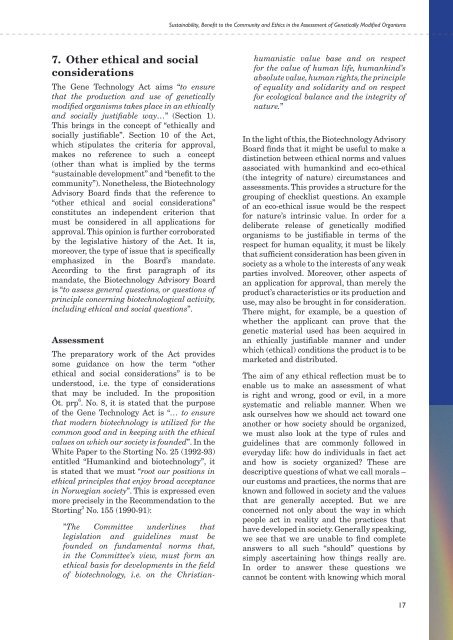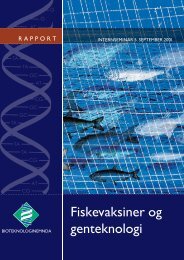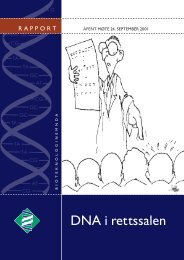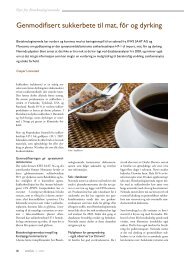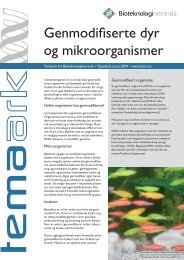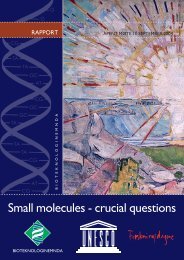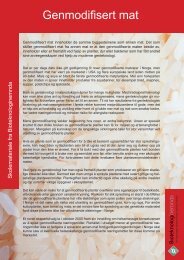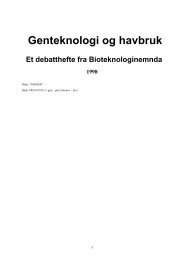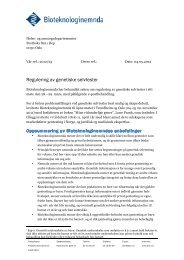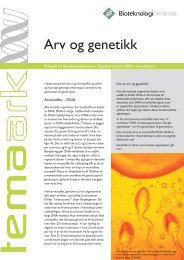Sustainability, Benefit to the Community and Ethics
Sustainability, Benefit to the Community and Ethics
Sustainability, Benefit to the Community and Ethics
- No tags were found...
Create successful ePaper yourself
Turn your PDF publications into a flip-book with our unique Google optimized e-Paper software.
<strong>Sustainability</strong>, <strong>Benefit</strong> <strong>to</strong> <strong>the</strong> <strong>Community</strong> <strong>and</strong> <strong>Ethics</strong> in <strong>the</strong> Assessment of Genetically Modified Organisms7. O<strong>the</strong>r ethical <strong>and</strong> socialconsiderationsThe Gene Technology Act aims “<strong>to</strong> ensurethat <strong>the</strong> production <strong>and</strong> use of geneticallymodified organisms takes place in an ethically<strong>and</strong> socially justifiable way…” (Section 1).This brings in <strong>the</strong> concept of “ethically <strong>and</strong>socially justifiable”. Section 10 of <strong>the</strong> Act,which stipulates <strong>the</strong> criteria for approval,makes no reference <strong>to</strong> such a concept(o<strong>the</strong>r than what is implied by <strong>the</strong> terms“sustainable development” <strong>and</strong> “benefit <strong>to</strong> <strong>the</strong>community”). None<strong>the</strong>less, <strong>the</strong> BiotechnologyAdvisory Board finds that <strong>the</strong> reference <strong>to</strong>“o<strong>the</strong>r ethical <strong>and</strong> social considerations”constitutes an independent criterion thatmust be considered in all applications forapproval. This opinion is fur<strong>the</strong>r corroboratedby <strong>the</strong> legislative his<strong>to</strong>ry of <strong>the</strong> Act. It is,moreover, <strong>the</strong> type of issue that is specificallyemphasized in <strong>the</strong> Board’s m<strong>and</strong>ate.According <strong>to</strong> <strong>the</strong> first paragraph of itsm<strong>and</strong>ate, <strong>the</strong> Biotechnology Advisory Boardis “<strong>to</strong> assess general questions, or questions ofprinciple concerning biotechnological activity,including ethical <strong>and</strong> social questions”.AssessmentThe prepara<strong>to</strong>ry work of <strong>the</strong> Act providessome guidance on how <strong>the</strong> term “o<strong>the</strong>rethical <strong>and</strong> social considerations” is <strong>to</strong> beunders<strong>to</strong>od, i.e. <strong>the</strong> type of considerationsthat may be included. In <strong>the</strong> propositionOt. prp 6 . No. 8, it is stated that <strong>the</strong> purposeof <strong>the</strong> Gene Technology Act is “… <strong>to</strong> ensurethat modern biotechnology is utilized for <strong>the</strong>common good <strong>and</strong> in keeping with <strong>the</strong> ethicalvalues on which our society is founded”. In <strong>the</strong>White Paper <strong>to</strong> <strong>the</strong> S<strong>to</strong>rting No. 25 (1992-93)entitled “Humankind <strong>and</strong> biotechnology”, itis stated that we must “root our positions inethical principles that enjoy broad acceptancein Norwegian society”. This is expressed evenmore precisely in <strong>the</strong> Recommendation <strong>to</strong> <strong>the</strong>S<strong>to</strong>rting 3 No. 155 (1990-91):”The Committee underlines thatlegislation <strong>and</strong> guidelines must befounded on fundamental norms that,in <strong>the</strong> Committee’s view, must form anethical basis for developments in <strong>the</strong> fieldof biotechnology, i.e. on <strong>the</strong> Christianhumanisticvalue base <strong>and</strong> on respectfor <strong>the</strong> value of human life, humankind’sabsolute value, human rights, <strong>the</strong> principleof equality <strong>and</strong> solidarity <strong>and</strong> on respectfor ecological balance <strong>and</strong> <strong>the</strong> integrity ofnature.”In <strong>the</strong> light of this, <strong>the</strong> Biotechnology AdvisoryBoard finds that it might be useful <strong>to</strong> make adistinction between ethical norms <strong>and</strong> valuesassociated with humankind <strong>and</strong> eco-ethical(<strong>the</strong> integrity of nature) circumstances <strong>and</strong>assessments. This provides a structure for <strong>the</strong>grouping of checklist questions. An exampleof an eco-ethical issue would be <strong>the</strong> respectfor nature’s intrinsic value. In order for adeliberate release of genetically modifiedorganisms <strong>to</strong> be justifiable in terms of <strong>the</strong>respect for human equality, it must be likelythat sufficient consideration has been given insociety as a whole <strong>to</strong> <strong>the</strong> interests of any weakparties involved. Moreover, o<strong>the</strong>r aspects ofan application for approval, than merely <strong>the</strong>product’s characteristics or its production <strong>and</strong>use, may also be brought in for consideration.There might, for example, be a question ofwhe<strong>the</strong>r <strong>the</strong> applicant can prove that <strong>the</strong>genetic material used has been acquired inan ethically justifiable manner <strong>and</strong> underwhich (ethical) conditions <strong>the</strong> product is <strong>to</strong> bemarketed <strong>and</strong> distributed.The aim of any ethical reflection must be <strong>to</strong>enable us <strong>to</strong> make an assessment of whatis right <strong>and</strong> wrong, good or evil, in a moresystematic <strong>and</strong> reliable manner. When weask ourselves how we should act <strong>to</strong>ward oneano<strong>the</strong>r or how society should be organized,we must also look at <strong>the</strong> type of rules <strong>and</strong>guidelines that are commonly followed ineveryday life: how do individuals in fact act<strong>and</strong> how is society organized? These aredescriptive questions of what we call morals –our cus<strong>to</strong>ms <strong>and</strong> practices, <strong>the</strong> norms that areknown <strong>and</strong> followed in society <strong>and</strong> <strong>the</strong> valuesthat are generally accepted. But we areconcerned not only about <strong>the</strong> way in whichpeople act in reality <strong>and</strong> <strong>the</strong> practices thathave developed in society. Generally speaking,we see that we are unable <strong>to</strong> find completeanswers <strong>to</strong> all such “should” questions bysimply ascertaining how things really are.In order <strong>to</strong> answer <strong>the</strong>se questions wecannot be content with knowing which moral17


